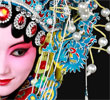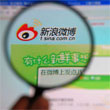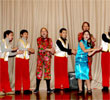Top 10 cultural events of 2010
Editor's note:The year 2010 saw a number of cultural events and phenomena draw public attention, including a prominent author's withdrawal from the Writers' Association.
|
Peking Opera listed as intangible cultural heritage |
Peking Opera, a 200-year-old art form, was listed as an intangible cultural heritage by UNESCO. Peking Opera comprises singing, acting and martial arts, and is usually performed by actors in flamboyant costumes and exaggerated facial make-up. UNESCO has so far adopted 160 art forms from 77 countries and regions as intangible cultural heritages. [full story]
|
Zheng Yuanjie announces withdrawal from the Chinese Writers Association (CWA) |
Noted Chinese children's writer Zheng Yuanjie announced his withdrawal from the CWA on April 25 on his blog, saying he was disappointed with Cao Wenxuan, vice-chairman of the CWA, and ashamed to work with him. [full story]
|
China's autumn auction market |
The frenetic enthusiasm for Chinese art shows no sign of dying down as prices of calligraphy and traditional Chinese paintings set new records in the autumn auction. [full story]
|
The 5th Beijing International Culture Creativity Industry Exposition (ICCIE) |
The 5th ICCIE, an annual cultural feast held to showcase China's innovative talent, closed in Beijing on November 21. The participants, including performance companies, publishing houses, film and animation studios, and online games companies, reported total investment of 47.8 billion yuan, an astonishing growth of 30.3 percent year on year. [full story]
|
Micro-blogging takes off in China |
The emergence of micro-blogging in recent years has had a huge impact on China's internet industry. Working the same way as Twitter, the service is expanding fast among internet users. [full story]
|
Authenticity of Cao Cao's tomb sparks hot debate |
The discovery of the tomb of Chinese legendary general Cao Cao (155-220) made a big splash. Archaeologists fiercely debated the authenticity of the tomb, but finally agreed in September that it was indeed that of Cao Cao - a prominent figure in the Three Kingdoms period (184-280). The tomb was discovered in the village of Xigaoxue near Anyang in Henan Province. [full story]
|
Lu Xun Translation award left vacant |
A jury from the Chinese Writers' Association (CWA) failed to select a winner for the translation award of the Lu Xun Literature Prize. It was the first time the translation prize was left vacant in the history of the Lu Xun awards, which are held every three years. [full story]
|
The Year of Chinese Language in Russia |
The Chinese Language Year in Russia is deepening mutual understanding and enhancing bilateral ties between the two countries. Starting in March this year, the program organized more than 200 events in 23 regions of Russian. The program officially ended on November 24, but some events will run until the end of the year. [full story]
|
Rival towns battle over dead celebrities |
Deceased celebrities seem to have developed magic powers of self-replication as rival towns claim them as their own. In order to build up their tourist industries, towns claim to be the birth or burial places of heroes and celebrities from Chinese history. Fierce arguments can erupt among towns with rival claims. [full story]
|
Writers of youth fiction top fortune list |
The richest authors in China are those who write books for young people. The top three authors on the 2010 25 Richest Chinese Writers list, Yang Hongying, Guo Jingming and Zheng Yuanjie, all write fiction aimed at children and teens. [full story]
 0
0 
















